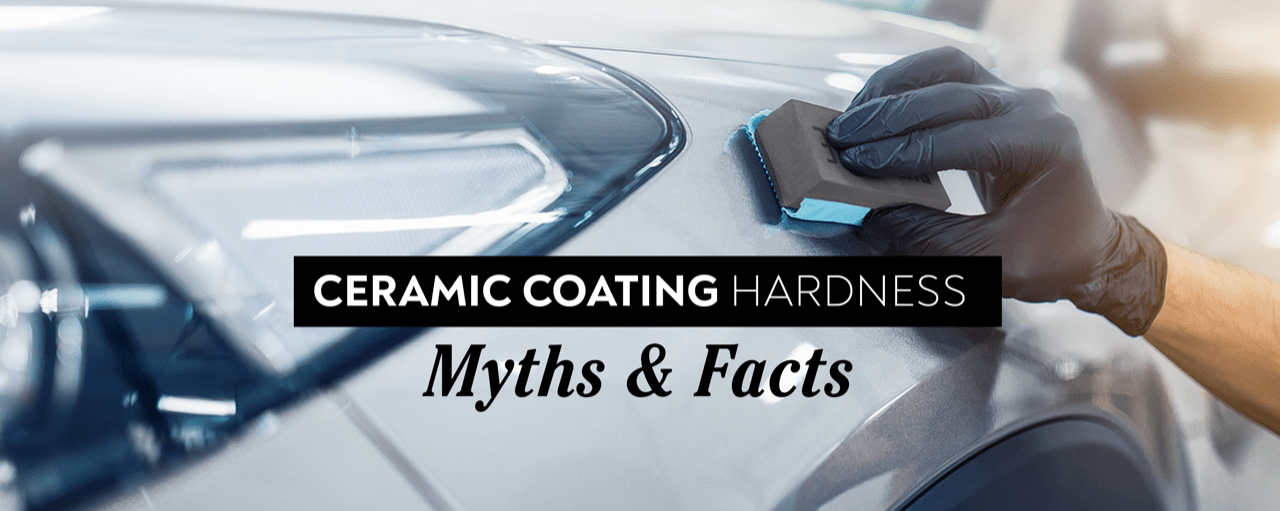FREE US SHIPPING ON ORDERS $75+ (LOWER 48 STATES)
FREE DETAILING ADVICE +1-877-838-2672

Ceramic coating is a rather controversial subject matter as vehicle detailers and formulators of ceramic coating products may make countless claims that vary from one end of the spectrum to the other with pricing scales doing the same. One of the various claims of ceramic coatings that have prompted long-drawn-out conversations followed up with questionable results is the hardness of ceramic coatings, which can range from 1 to 10 on the Mohs hardness scale, or from 2H to 9H on the Pencil Hardness scale with 2H being the softest and 9H being the hardest.
On the typical hardness scale (Mohs), 10 is the hardness of a diamond, and 1 would be that of Talc. The claim of a 9H hardness, which applies to automotive coatings such as ceramic, would be about 3 on the Mohs scale, which is the equivalent to Calcite, a stable carbonate mineral commonly used as a component of limestone in the production of cement and other construction aggregates. Having such a hardness claim is essentially a good thing when it comes to a ceramic coating, especially considering the application is in a liquid composition that either has an included hardener or a hardener application. However, having a hardness of 9H, which may be misleading, is usually not good for a ceramic application considering the application must flex. If a ceramic is supposedly at a 9H hardness it may essentially flake off or break off when a panel that it is applied to flexes. It's like applying a diamond coating to your paint that simply may not work well because a diamond does not flex or bend. Fundamentally, claims of a 9H ceramic for automotive applications is a marketing ploy where the hardness would be the equivalent of a diamond.
9H Hardness Ceramics Debunked
Just because a ceramic coating says it has a 9H hardness doesn’t necessarily mean it’s the best ceramic coating, or “good” for that matter, and such a claim may be debunked through the longevity of its durability. At such a level, the coating may break off as it fails to have the properties to flex or bend with the surface. A 5H or 7H hardness coating is able to bend and flex with the surface instead of breaking away. However, there are many legitimate ceramic coatings on the market with a 7H hardness that will essentially provide a long-lasting durable coating that offers protection for about 5 years, which is found in our TopCoat® Crystaleen® product.
While a 9H hardness is possible in some industrial applications, the automotive ceramic coating market may take advantage of such a claim and mislead consumers. Through TopCoat's research and two decades of experience we can uncover the truths in the detailing market to better serve our consumers and provide a superior product.
TopCoat® Crystaleen® is a revolutionary coating technology that was originally developed for the aerospace industry and since has been made available for vehicles. Best of all, TopCoat® Crystaleen® can be applied yourself or professional detailers. Made in the USA, TopCoat® Crystaleen® is one of few products that tout long-lasting protection with its water-repelling elements to provide a true hydrophobic coating. Moreover, TopCoat® Crystaleen® can be layered for additional long-lasting protection.
As a do-it-yourself professional ceramic coating, TopCoat® Crystaleen® has a 7H hardness level, which is the hardest among ceramic coatings for vehicles available on the market. Using TopCoat®’s proprietary and patented Molomer technology, Crystaleen® permanently bonds to your vehicle, is resistant to heat and UV damage, and has an Ionic-Bond positive charged protective layer coating to repel dust and dirt.
Lastly, TopCoat® F11PRO®, taking what is already great about TopCoat® F11® and making it better, is a functional ceramic that lasts 12+ months. F11PRO® was developed as a non-permanent ceramic coating meaning you get all the benefits of a hard coat from a ceramic without the long-term problems or costs associated with other ceramics and the daunting application process for ceramics that require a professional application.

We want you to be 100% satisfied with everything you buy from TopCoat. And if you’re not entirely happy with your purchase we will refund your money in full, or exchange the goods. All we ask is that you contact our customer services and then return the products back to us.